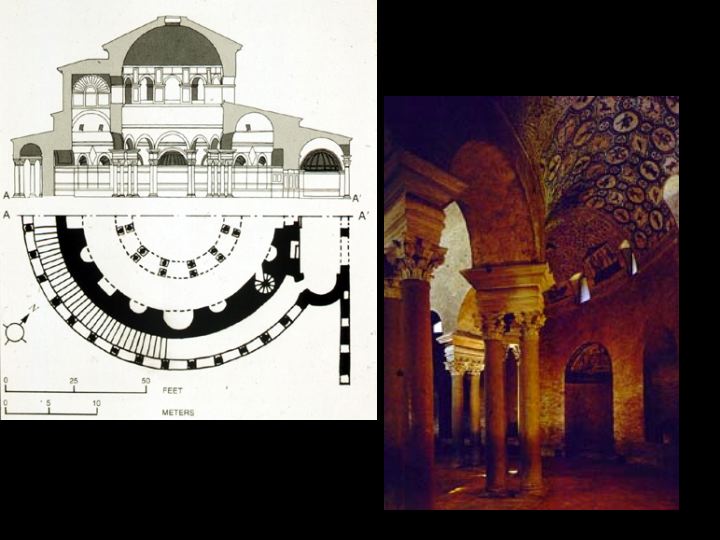 |
|
aphrodite of cnidus imperial roman copy artist: praxitiles date: significance: first female nude sculpture?? |

|
|
Warrior from Riace date: 5th cent. BCE artist: unknown bronze |

|
|
Myron of Eleutherae, Discobolos Roman copy of Greek original, circa mid-5th cent.
|

|
|
Charioteer at Delphi, from Sanctuary of Apollo date: 478-474 BCE bronze, Greek
|
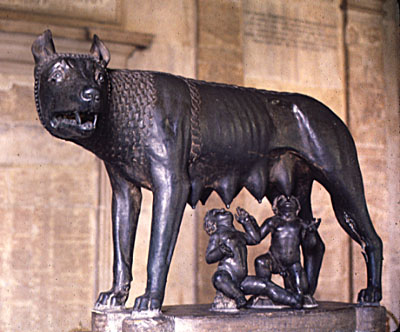
|
|
She-wolf c. 500 BCE bronze |

|
|
Apollo at Veii c. 500 BCE terracotta, Etruscan |

|
|
plan and elevation of an Etruscan temple -colonnaded porch, 3 cellas |

|
|
interior of the Tomb of the Reliefs Cerveteri, Italy, c. 300 BCE Etruscan |

|
|
Sarcophagus from Caere Cerveteri, Italy c. 520 BCE terracotta, Etruscan
|

|
|
Venus de Milo/Aphrodite of Melos c.150-125 BCE marble, Hellenistic |

|
|
Nike of Samothrace c.190 BCE marble, Hellenistic |
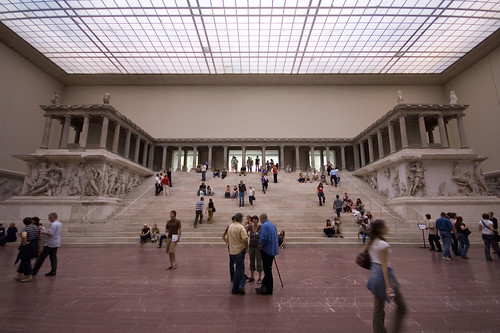
|
|
Altar of Zeus Pergamum, c. 175 BCE marble, Hellenistic memorial to war which established Rome as dominant power over eastern Mediterranean; marks beginning of the end of the Hellenic world.
|

|
|
Giant, from the Altar of Zeus at Pergamum c. 175 BCE marble, Hellenistic
|

|
|
Alexander Mosaic, Battle of Issus House of Faun, c.1st cent. BCE (probably copy of original Greek fresco c.300 BCE) stone mosaic, Hellenistic |

|
|
Laocoon and his two sons Hagesandrus, Polydorus and Athenodorus 1st cent. AD Roman copies of a Hellenistic original |
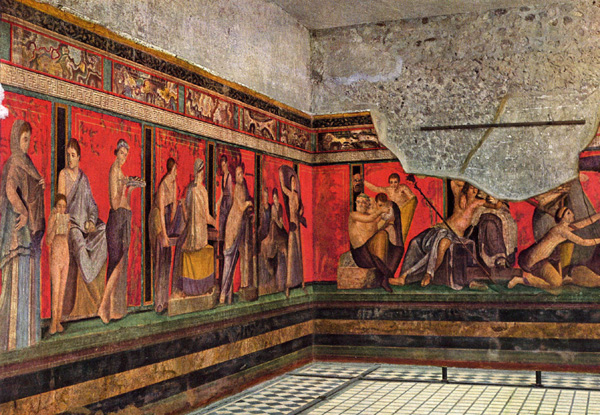
|
|
Dionysiac Mystery Cult Villa of the Mysteries, Pompeii, c. 50 BCE wall painting figures' poses are Hellenistic in style |
|
|
|
Maison Carre Nimes, France, c. 1st cent. CE(AD) Roman temple, blending Etruscan and Greek temple elements; illusionism - "pseudoperipteral" - colums in front portico are weight bearing, others are engaged and part of outter cella wall serving only a decorative function |

|
|
Pont du Gard near Nimes, France, c. late 1st cent. BCE dressed stone commissioned by Marcus Agrippa aqueduct spans 30 miles across the plain and vallet of the river Gardon to Nimes. |

|
|
superimposed orders Roman use of Greek orders colums placed successively from heaviest to lightest - doric, ionic, carinthian |

|
|
Colosseum Rome, 70-82 CE |

|
|
Pantheon Rome, c. 118-28 CE |

|
|
Augustus of Primaporta c. early 1st cent. CE marble portrait head produced independently of the body, adjustments made to body copied directly from Greek original, this portion could be purchased from stock |

|
|
Ara Pacis Augustae Rome, c. 13-9 BCE mabrle marked return of Augustus to Rome in 13BCE; frieze depicts dedication ceremony of monument |

|
|
Patrician with two portrait heads of ancestors Rome, c.15 CE marble patrician - a member of the upper class of ancient Roman society notion of family was so strong in ancient Rome that it almost amounted to ancestor worship; the right to make portraits of ancestors was restricted by law to patricians only |

|
|
Equestrian Statue of Marcus Aurelius Capitoline Hill in Rome, c. 161-80 CE bronze detailed curls of hair and beard suggest greatness of character; figure and horse thought to be cast separately as they are not made to a proportionate scale |
|
|
|
Arch to Titus Rome, 113 CE marble, concrete façade colums are Composite order - combo of ionic and corinthian elements reliefs on passageway - Titus and father, Vespasian, celebrates suppression of a Jewish revolt |

|
|
Trajan's Column Rome, 113 CE marble originally topped by statue of the emporer (now with St. Peter), it commemorates his campaigns in Dacia (now Romania) in AD 101 and 105-6; events depicted in spiral wraping around column in chronological sequence from bottom to top
|
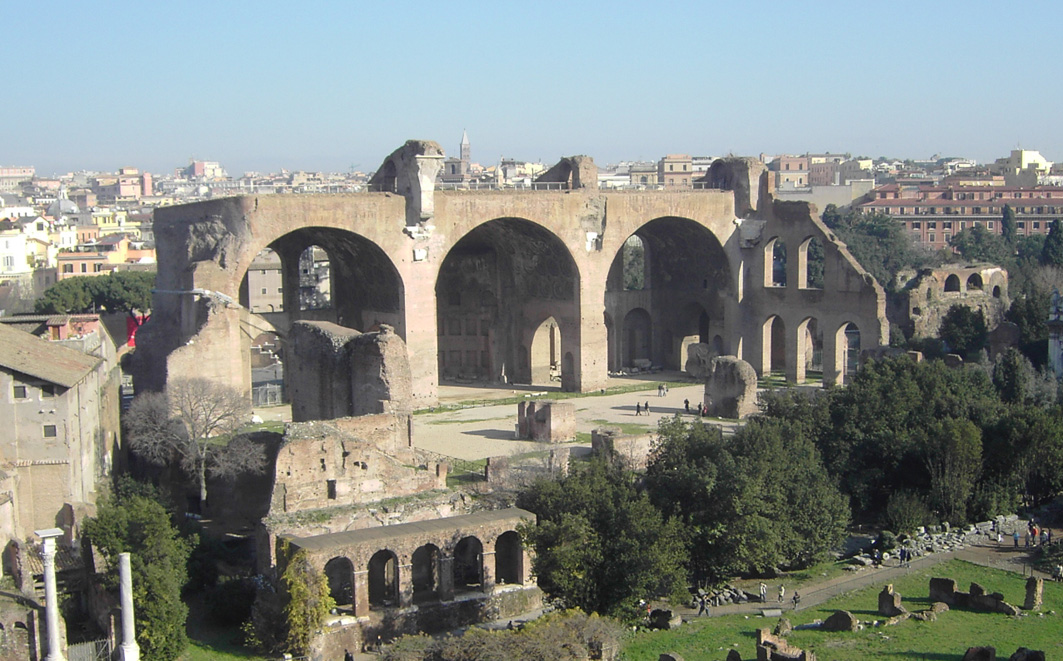
|
|
Basilica of Maxentius Rome 307-12 CE completed by Constantine the last great Roman building in Rome |
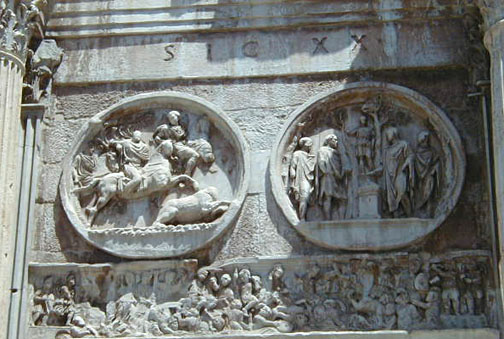
|
|
Reliefs from the Arch of Constantine, Medallions Rome, 117-38 CE, frieze - early 4th cent. CE
|
 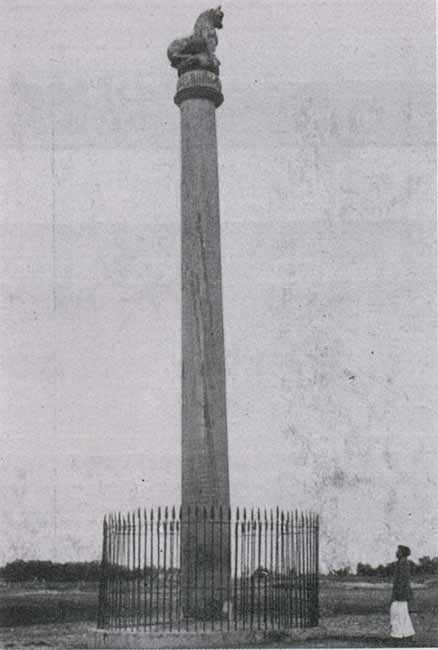
|
|
Lion Column at Lauriya Nandangarh India, 243 CE |
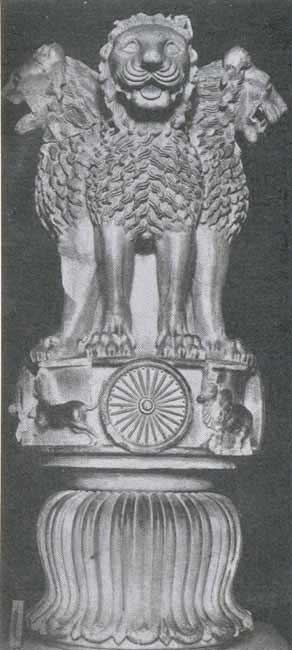
|
|
Lion Capital, from an Asokan column India, 3rd cent. CE
|
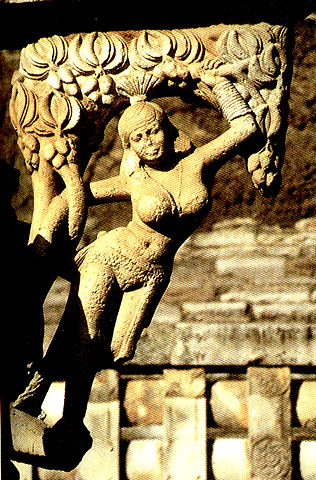
|
|
Yakshi, detail of east gate at the Great Stupa, Sanchi India, 1st cent. BCE |

|
|
Great Stupa at Sanchi India, 2nd and 1st cents. BCE
|
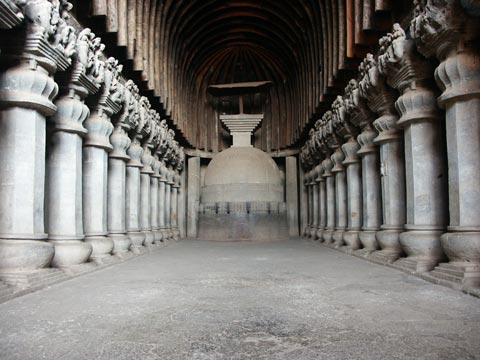
|
|
Chaitya-hall Karli, India, 120 CE |

|
|
Exterior of cave temple Ajanta, India, 4th cent. CE
|
|
|
|
King Prasenajit visits the Buddha detail froma relief from the Bharhut stupa early 2nd cent. BCE
|

|
|
Head of Buddha from Gandhara 3rd cent. CE lime composition |

|
|
Seated Buddha from Katra Mathura, India, 2nd cent. CE red sandstone |

|
|
Teaching Buddha from Sarnath, India Gupta period, 5th cent. CE |

|
|
Great Bodhisattva, Cave 1 Ajanta, India, 7th cent. CE
|
|
|
|
Vishnu on Ananta, Vishnu temple Deogarh, India, 5th cent. CE
|
|
|
|
Shiva Mahadeva, Shiva temple Elephanta, India, mid 6th cent. CE |

|
|
Linga, Shiva temple Elephanta, India, mid 6th cent. CE |
|
|
|
Kailasa temple Ellora, India, 750-850 CE |
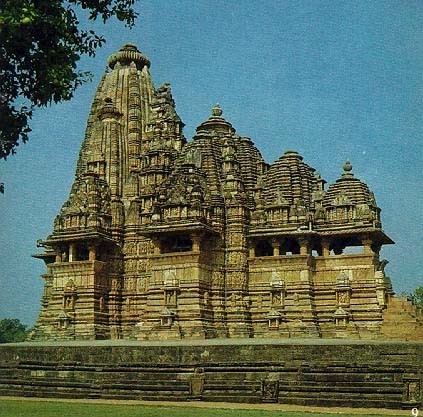
|
|
Khandariya Mahadeva temple Khajuraho, India, 1000 CE
|
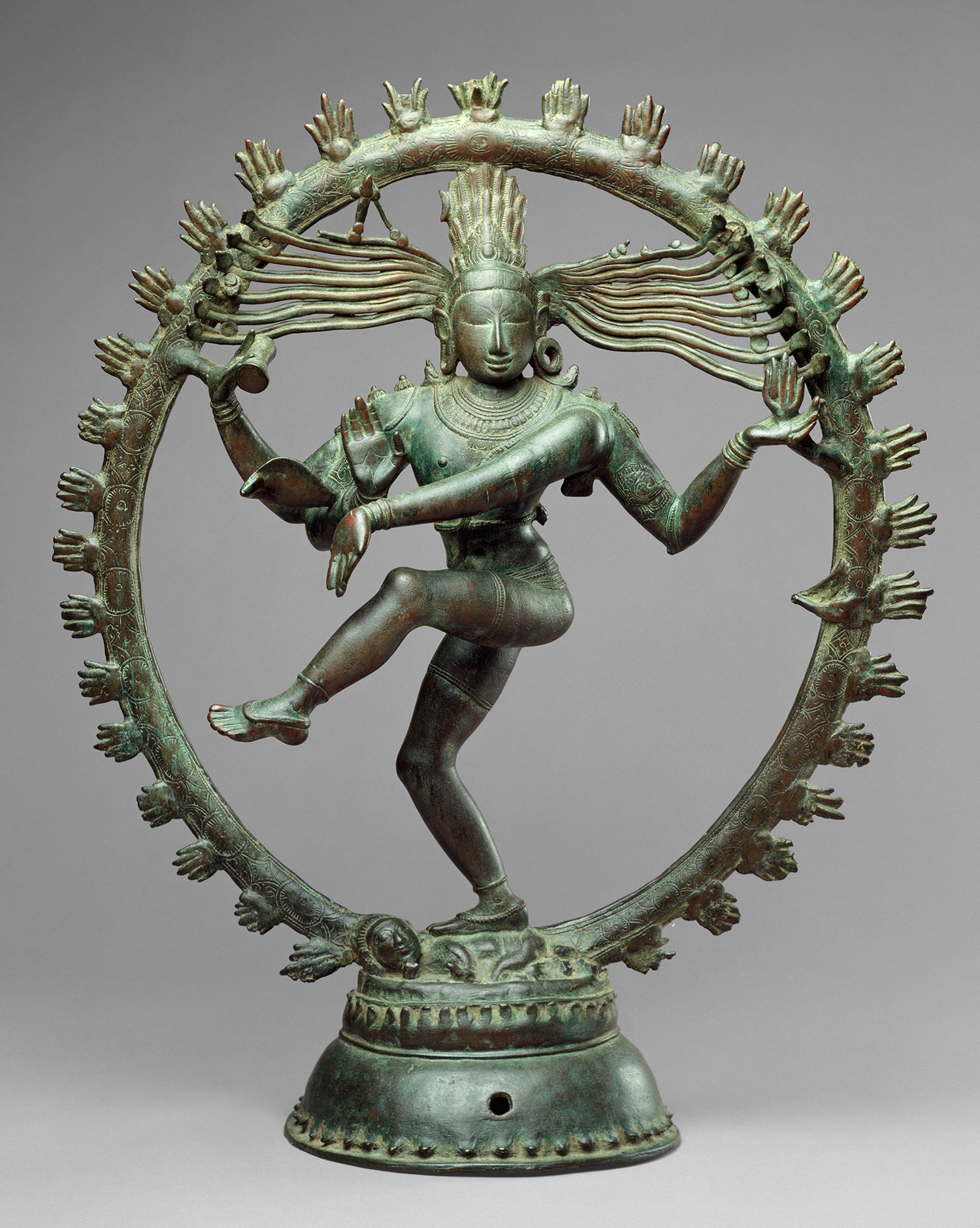
|
|
Shiva Nataraja Chola period, 11th-12th cents. CE bronze
|

|
|
tomb of Emperor Qin Shihuangdi Shaanxi, China (near Xi'an), c. 221-209 BCE life size terracotta figures
|

|
|
Wei Gai, Alllegorical Scene In rubbing from stone relief in the Wu family shrine Jiaxiang, Shandong, China, c. 151 CE |
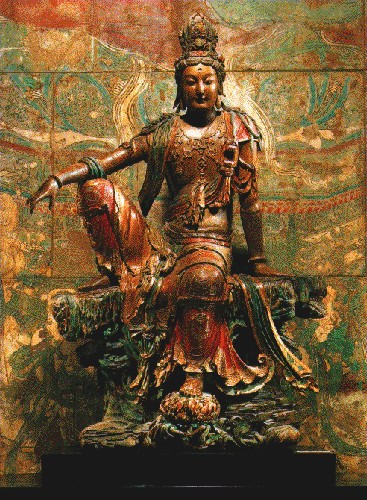
|
|
Guanyin 10th - 12th cent CE polychrome wood |
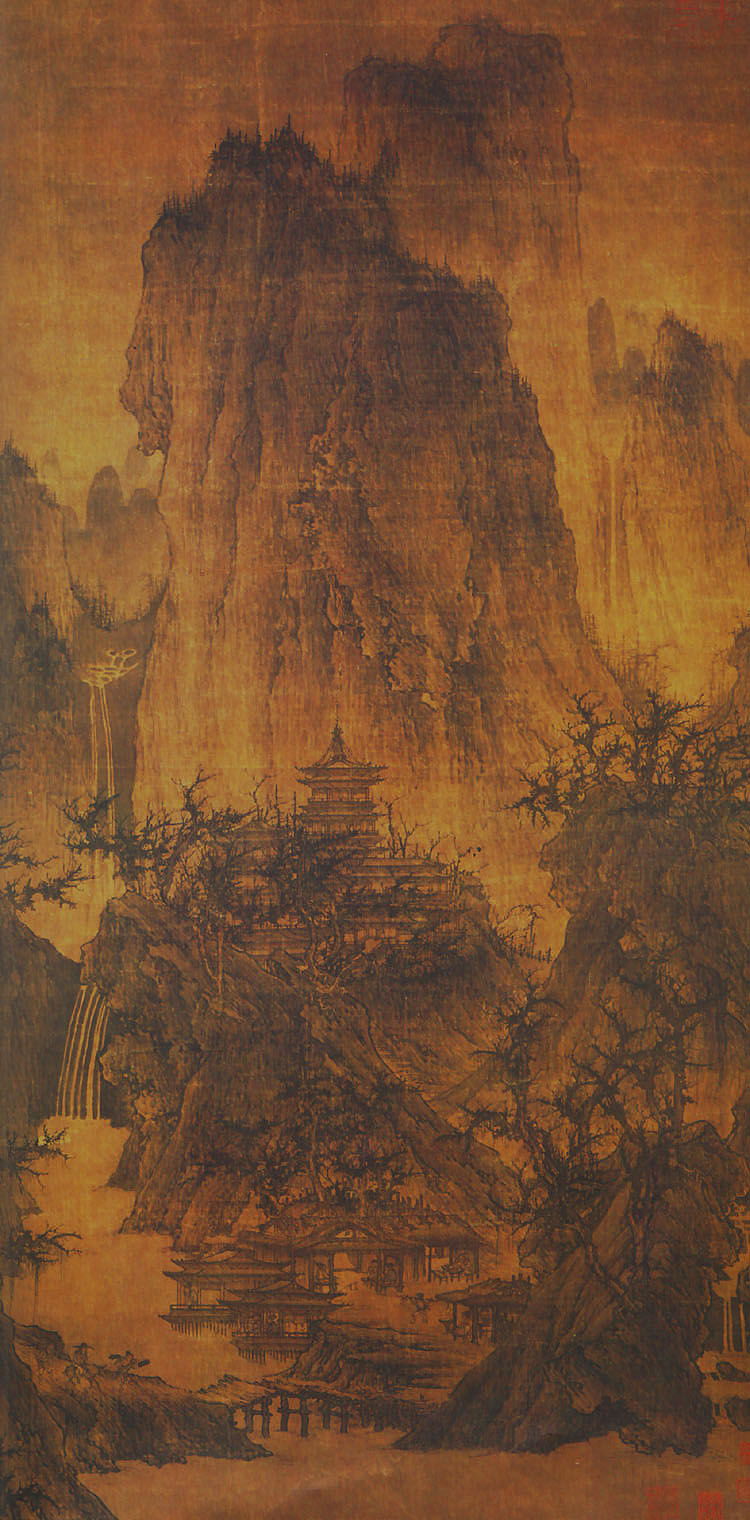
|
|
A Solitary Temple Amid Clearing Peaks c. 950 CE artist:Li Cheng hanging scroll on silk
|
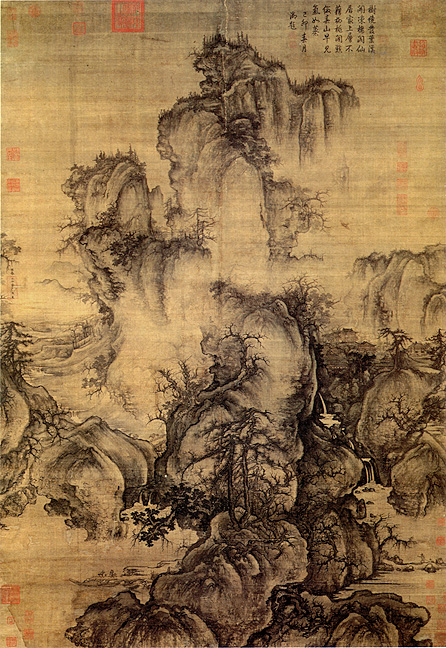
|
|
Early Spring 1072 CE artist: Guo Xi hanging scroll on silk |

|
|
Twelve Views from a Thatched Cottage c.1200-30 artist: Xia Gui handscroll, ink on silk |

|
|
Double Screen artist: Shou Wenju short handscroll, ink and color on silk
|
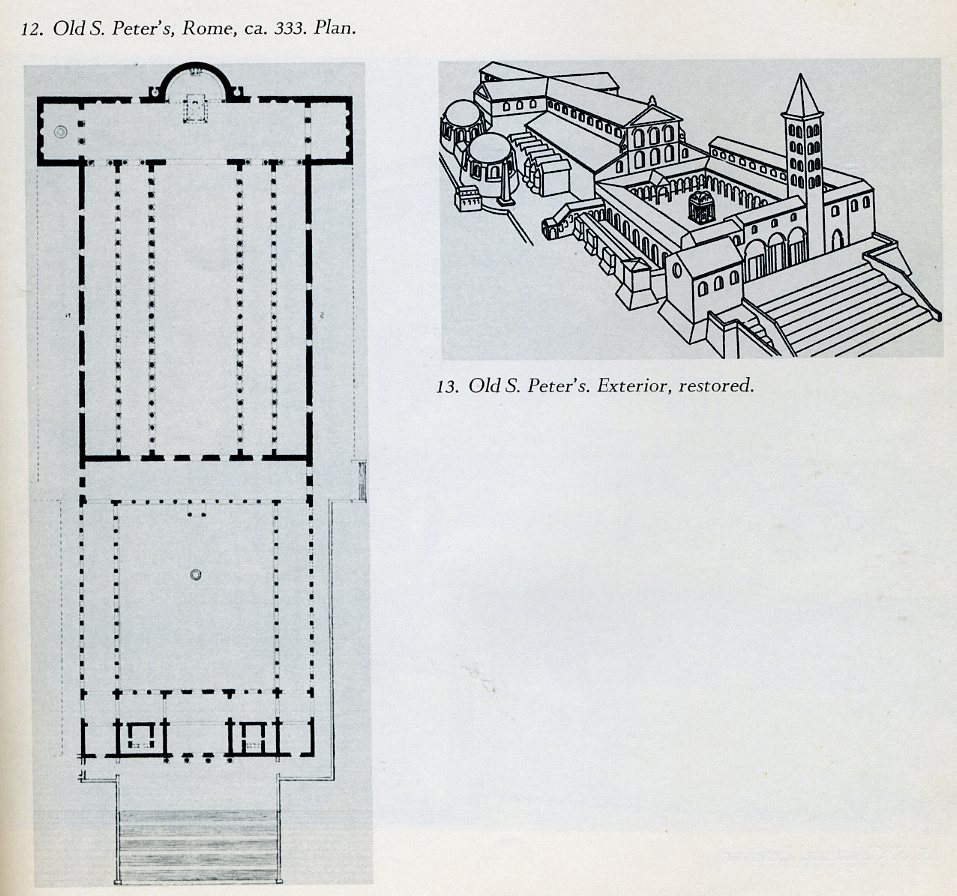
|
|
Plan of Old St. Peter's Rome |
|
|
|
Sta. Costanza Rome, c. 350 CE elevation, 1/2 plan, interrior
exterior |
|
|
|
Sarcophagus of Junius Bassus 359 CE
|

|
|
The Miracle of the Loaves and Fishes Ravenna, c. 504 CE mosaic in S Apollinare Nuovo |
|
|
|
The Good Shepherd Ravenna, c. 425 CE mosaic in the Mausoleum of Galla Placidia |
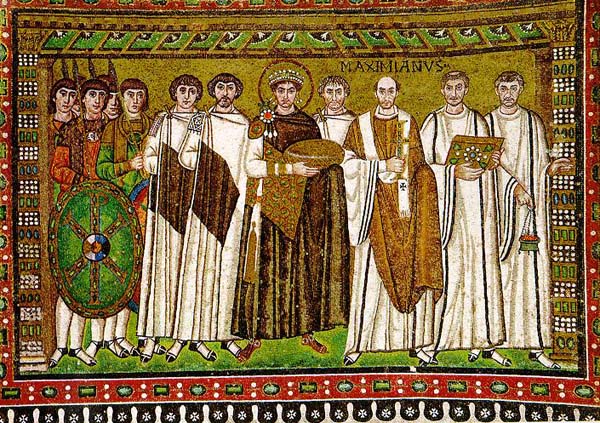
|
|
Justinian and his Retinue Ravenna, c. 547 CE mosaic in the apse of S. Vitale |
|
|
|
S. Vitale Ravenna, c. 540-47 CE |

|
|
S. Vitale, plan and section view Ravenna |
|
|
|
Hagia Sohpia Constantinople (now Istanbul), completed 537 CE
Anthemius of Tralles and Isidorus of Miletus - mathmeticians who designed the church |

|
|
The Virgin and Child Enthroned between Saints Theodore and George 6th cent. CE Monestary of St. Catherine, Mt. Sinai, Egypt Early Medieval |
|
|
|
Odo of Metz, Palatine Church of Charlemagne Aachen, 792-805 CE
|

|
|
Plan of the Monastery of St. Gall Switzerland, c. 820 CE
|

|
|
St. Michael Hildesheim, Germany, c. 1001-31 CE |
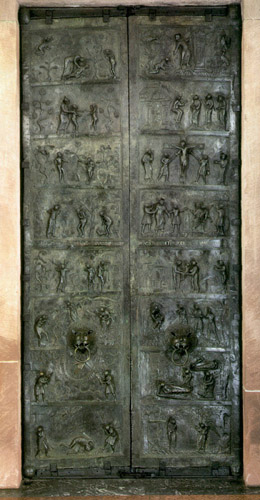
|
|
Bronze Doors with Secens from the Old and New Testament St. Michael, Hildesheim, c. 1015 CE Bishop Bernward |
|
|
|
St. Sernin Toulouse, France, c. 1080-1120 CE
|
|
|
|
Giselbertus tympanum Autun Cathedral, France, c. 1130 CE |

|
|
central portal of Ste. Madeleine Vezelay, France, c. 1120-32 |
|
|
|
chevet in plan and interior view of the abbey church of St. Denis near Paris, France, 1140-44 CE
|
|
|
|
Amiens Cathedral France, c. 1220-36 CE |
|
|
|
rose window and arial view of the Chartres Cathedral Notre Dame, France, c. 1230 CE |
|
|
|
façade of Reims Cathedral France, 1255-60 CE |

|
|
west (royal) portal of Chartres Cathedral France, 1145-70 CE |

|
|
jamb figures of the west (royal) portal of Chartres Cathedral France, c. 1145-70 CE |

|
|
jamb figures in west portal of Reims Cathedral France, c. 1225-55 CE
|





